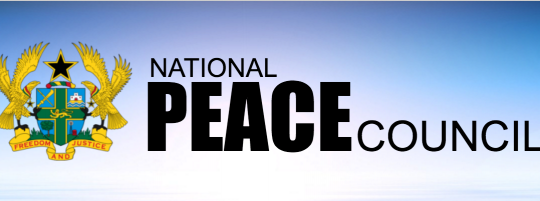The National Peace Council (NPC) has inaugurated 40 ambassadors/volunteers who will contribute to the prevention of violent extremism in some selected communities in Ghana.
The 40 volunteers were selected from Ashaiman, Maamobi-Newtown-Nima, Madina, Odododiodio and Techiman were inaugurated under the project dubbed: “Preventing Violent Extremism: The Gender Perspective and Women’s Role.”
The Volunteers would undergo a two-day training programme following the inauguration.
They are expected to delve into topics such as: Early warning signals and preventing violence, structure and mandate of the NPC, Concepts and Definitions on Violent extremism and Terrorism, Responsibility and Expectation as an ambassador in preventing violent extremism.
Violent extremism is a form of extremism that condones and enacts violence with ideological or deliberate intent, such as religious or political violence.
It is also the beliefs and actions of people who support or use violence to achieve ideological, religious, or political goals.
Inaugurating the volunteers at a ceremony in Accra on Thursday, Reverend Dr Ernest Adu-Gyamfi, Chairman, NPC, told the volunteers that their assignment entailed a lot of hard work but without any monetary reward.
“As volunteers, you have the responsibility to promote safe space that will enable peaceful co- existence and support healthy engagement and sensitization that will build resilience against any attempt at patronage, recruitment and indoctrination of individuals or groups in behaviour that will lead to radicalization and violent extremists activities in your community and Ghana.”
Rev. Dr Adu- Gyamfi told the volunteers that their roles would not stand alone but would complement the efforts of the NPC in preventing any action of the extremists and terrorists.
“You will also be expected to provide timely early warning signs to enable the Peace Council and other responsible authorities to give a response to protect the peace and security of the country.
This is in line with the many policies and programmes put in place by the government to diffuse the plan of the extremists whilst we build community resilience.”
The NPC Chairman implored the volunteers to be strategic in their communication with the public so their communication does not lead to “Unnecessary panic” rather provide information that would open the minds of their community members to the destructive nature of violent action.
“Let me encourage you to always be mindful that, “prevention is better than cure.” This is necessary to enable the continuous growth and development expected of us as citizens, particularly for the youth and the generation after you.
You are to ensure that people operate within the law despite the difference in ideas. You are also to ensure that people exercise their freedoms responsibly as you join the Regional and District of the National Peace Council.
Rev Dr Adu-Gyamfi lauded the Canadian government through the Canadian Fund for Local Initiative for the support to the project.
He said the Council pledged the Council’s continued support to offer more training programmes to the youth and women to be resilient in prevention of violent extremism.
Mr Frank Wilson Bodza, Deputy Director, Conflict Management and Resolution, NPC said the NPC would provide the volunteers checklists of what they were expected to do in their respective communities.
Mr Bodza explained that the volunteers were selected from the various communities because of the economic activities that occur in those areas.
He said it was important that Ghana paid attention to violent extremism and learn from the various experiences in Northern Nigeria, Mali, and Burkina Faso, among others.
Mr Bodza reminded the volunteers to, “see and say issues responsibly. ”
He was optimistic that the volunteers after receiving the training would in turn train others within the communities.








![Fuse ODG violently handcuffed, dragged out of his car by UK Police over alleged ‘Wee’ smell [Video]](https://ghananewss.com/storage/2023/05/Fuse-ODG-hand-100x75.jpeg)





